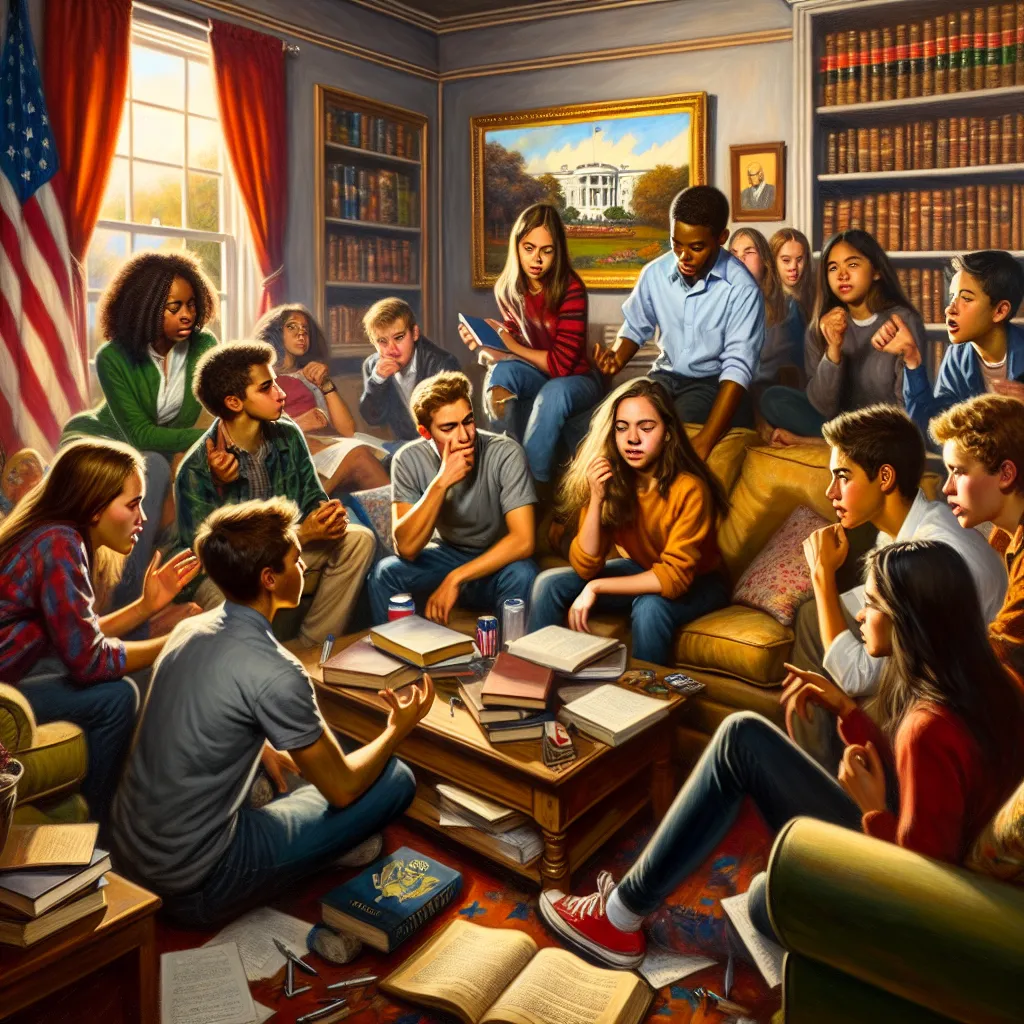
"Generation of Change"
Ethan sat at his cluttered desk, his history notes sprawled out in front of him. The weight of realization had hit him hard: the future of his country was in the hands of his generation, and voting was the key. He had always been passionate about history, but now it felt more urgent, more personal. He needed to understand the intricacies of the American government to make informed decisions and inspire his peers to do the same.
He flipped through his notes, revisiting the foundational moments of American history. The drafting of the Constitution, the debates between Federalists and Anti-Federalists, the establishment of the three branches of government—each detail seemed to pulse with newfound significance. Ethan knew that understanding the past was crucial to shaping the future.
Determined to make a difference, Ethan decided to form a discussion group with his friends. He reached out to his classmates, explaining his idea and inviting them to join. To his delight, many were eager to participate. They gathered in his living room, a diverse group of teenagers with different backgrounds and perspectives, united by a common goal.
Ethan began the first meeting by outlining the structure of the government. "The Constitution sets up three branches: the legislative, the executive, and the judicial," he explained. "Each branch has its own powers and responsibilities, and they work together to ensure a balance of power."
His friend Maria chimed in, "That's the system of checks and balances, right? Each branch can check the power of the others to prevent any one branch from becoming too powerful."
"Exactly," Ethan replied, feeling a surge of pride at their engagement. "For example, Congress can pass laws, but the President can veto them. The Supreme Court can declare laws unconstitutional. It's all about maintaining equilibrium."
They delved into the roles of the different tiers of government—federal, state, and local. Ethan emphasized the importance of understanding how each level impacted their daily lives. "Local governments handle things like schools, police, and zoning laws. State governments manage public health, transportation, and more. And the federal government oversees national defense, foreign policy, and interstate commerce."
As the discussions continued, Ethan noticed a divergence in opinions. Some of his peers had different views on what democracy should look like. One evening, the conversation took a particularly heated turn.
"I don't think the government should have so much control over our lives," said Jake, a passionate libertarian. "We need more personal freedom and less regulation."
"But without regulations, corporations could exploit workers and damage the environment," countered Sarah, a staunch environmentalist. "The government has a responsibility to protect its citizens and the planet."
Ethan listened carefully, understanding that these debates were essential for a healthy democracy. "It's important to have these discussions," he interjected. "Democracy thrives on diverse viewpoints. We don't have to agree on everything, but we need to respect each other's perspectives and find common ground."
The group continued to meet regularly, exploring topics like civil rights, economic policy, and foreign relations. They invited guest speakers, including local politicians and activists, to provide different insights. Each meeting broadened their understanding and deepened their commitment to civic engagement.
Ethan realized that democracy was not just about voting; it was about being informed, participating in discussions, and advocating for change. He saw the power in their collective voices and the potential to shape a better future.
As election day approached, Ethan and his friends volunteered to register voters, canvass neighborhoods, and spread awareness about the importance of voting. They knew that their generation had the power to influence the direction of the country.
On election night, they gathered to watch the results, feeling a mix of excitement and anxiety. Regardless of the outcome, Ethan felt a profound sense of accomplishment. They had taken the first steps toward becoming active, informed citizens. They had embraced the responsibility of shaping their democracy.
Ethan looked around at his friends, grateful for their dedication and passion. He knew that their journey was just beginning, and he was optimistic about the future they would build together.